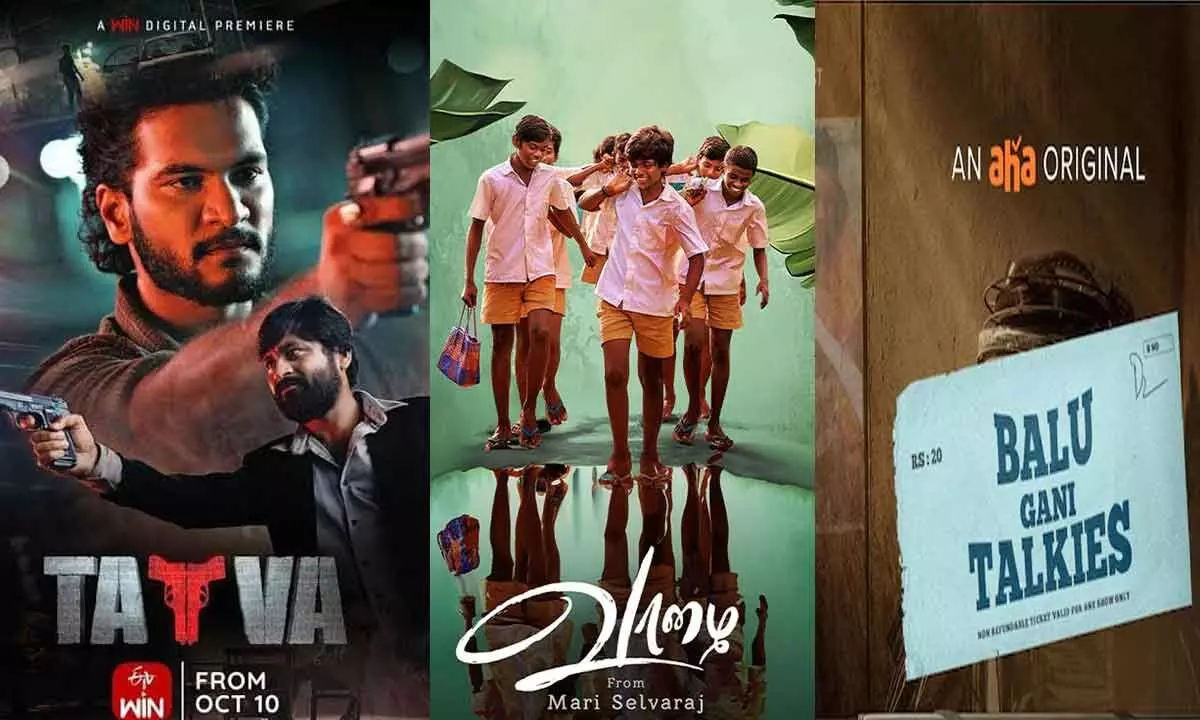Three Must-Watch OTT Films This October: Tatva, Balu Gani Talkies, and Vaazhai

Tatva, Balu Gani Talkies, and Vaazhai have captivated audiences with distinct storytelling, layered narratives, and culturally resonant themes, making them standout films in their own genres.
Tatva, Balu Gani Talkies, and Vaazhai have captivated audiences with distinct storytelling, layered narratives, and culturally resonant themes, making them standout films in their own genres. Each movie tackles different facets of human nature, belief, and societal values, showcasing the artistry and complexity that South Indian cinema has to offer. Here’s a look at why these three films have been winning acclaim and what makes them worth watching.
Tatva: A Philosophical Thriller Rooted in the Idea of Truth and Conscience
Tatva stands out as an introspective thriller, inviting viewers to ponder the consequences of manipulating truth. The plot revolves around a deep-rooted fear we all carry: facing the consequences of our actions and the “truth” that lies within. The director, Ruthvik Yelagari, crafts a philosophical narrative, allowing audiences to reflect on the concept of conscience as a moral compass, akin to a divine presence. The film explores how straying from truth leads to a conflict with one’s conscience, and the repercussions that follow.
The technical finesse of Tatva plays a significant role in its storytelling. With exceptional cinematography, clean editing, and impactful camera angles, the visuals amplify the film’s intensity. Every scene holds suspense, keeping the audience engaged and making them question the choices of the protagonist. Ruthvik’s direction is purposeful, channelling a single path with no distractions. The film captures the essence of karma and the inevitable justice dealt by one’s own conscience, a unique theme rarely explored in thrillers. Although the sound design has room for improvement, KRLKD Sai Teja’s music layers the story effectively, adding a haunting quality that complements the visual experience.
Balu Gani Talkies: A Rural Thriller with a Twist-Filled Climax
Balu Gani Talkies delivers a refreshing spin on the murder mystery genre, set in a small village where local theatre owner Balu (played by Shiva Ramachandravarapu) faces mounting suspicion after a death occurs in his struggling cinema hall. Director Viswanth weaves an engaging story where Balu’s attempt to improve his theatre’s reputation becomes the catalyst for a thrilling sequence of events. While the movie initially starts on a slower note, it builds momentum with unexpected twists that keep the audience guessing.
The standout aspect of Balu Gani Talkies is its climax, a well-executed, unpredictable conclusion that takes viewers by surprise, and changes the entire mood of the cinema which was from the beginning. The intricate cat-and-mouse game between Balu, the police, and various suspects is handled deftly, offering moments of suspense and revelation. The film has its share of limitations, particularly with sound quality and certain casting choices, but these are overshadowed by a strong script, and once the story hits its stride, it offers a captivating experience. With brief moments of humour and tension, Balu Gani Talkies is a gripping murder mystery that finds strength in its focused storyline and unexpected ending.
Vaazhai: A Heartfelt Story of Rural Life and Social Struggle
Director Mari Selvaraj’s Vaazhai is a rural drama inspired by true events, capturing the innocence, dreams, and hardships of a young boy named Sivanenjam in a small Tamil village. Unlike traditional narratives, Vaazhai is told through a child’s perspective, focusing on themes of hope and resilience in the face of poverty and exploitation. Sivanenjam’s innocent crush on his teacher, his experiences on the banana plantation, and his complex relationship with his family are depicted with authenticity, highlighting the beauty and challenges of rural life.
Vaazhai stands out due to its emphasis on community struggles against systemic oppression, as the villagers rally for fair wages from exploitative traders. Selvaraj subtly weaves themes of caste, capitalism, and the enduring spirit of a close-knit community, making this a powerful, thought-provoking film. Ponvel’s portrayal of Sivanenjam is deeply moving, embodying both the innocence of childhood and the burden of societal issues. The film’s visual and musical elements further enhance its impact, with cinematographer Theni Eswar’s evocative frames and Santhosh Narayanan’s moving soundtrack beautifully capturing the essence of the village setting.
Why These Films Matter
What makes Tatva, Balu Gani Talkies, and Vaazhai exceptional is their ability to tackle profound and diverse themes through grounded storytelling. These films succeed in presenting complex ideas, be it the confrontation with truth in Tatva, the cat-and-mouse suspense of Balu Gani Talkies, or the sociopolitical insights of Vaazhai. They showcase how South Indian cinema is evolving, exploring deeper human emotions and socio-cultural conflicts while maintaining strong narratives.
Together, these three films represent the richness of South Indian storytelling, offering unique perspectives that resonate beyond regional boundaries. Each one reminds viewers of the power of cinema to provoke thought, stir emotions, and inspire change, making them must-watch films for any cinephile looking to experience a blend of philosophy, suspense, and cultural depth.







